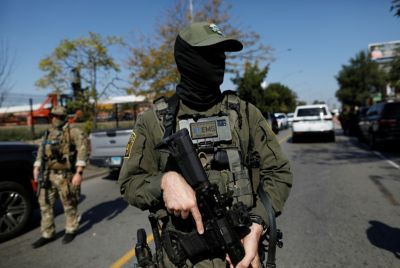Scheduled summits, unscheduled tantrums
The British Prime Minister had a good visit to China but received no praise for his part at the G20 Summit in Seoul, South Korea, immediately after. On his return to the Commons on 15 November 2010, Harriet Harman, standing in for Ed Miliband, hurled the jibe at Mr Cameron: "Britain needed to send a statesman to this summit but all we sent was a spectator."
David Cameron replied to this provocation by assuring the House that Britain had gone to Seoul with four priorities: to reduce the deficits, fight protectionism, promote development issues, and deal with trade imbalances. Progress, he assured the House, had been made on all four issues and for good measure, he told the Deputy Labour Leader, that all at Seoul were in agreement with his stance of reducing deficits sooner, rather than later.
A good defence and one which outlined the Summit's achievements more clearly than any official communiqué, for, truth to tell, it produced little of true substance. This is made clear in Norma Cohen's summary in the Financial Times of 13 November 2010: "...governments gave themselves another year to work out their differences."
The most important issue brought before the members of the Summit was a proposal put forward by the Americans. The plan was to resolve trade imbalances and exchange rates in the light of an IMF report which suggested a possible doubling of deficits of advanced economies by 2014. The United States expressed concern over the risk of competitive currency devaluations - China in mind? - and proposed that countries should restrain current-account surpluses and deficits to an agreed percentage of GDP. Four per cent of GDP to be precise.
Quite how this was to be made to work is as yet unclear as the proposal was immediately blocked by China and Germany, two of the world's biggest exporters. What a surprise! However it was agreed to continue with future discussions on deficit reductions with IMF assistance during 2011. One should not be over optimistic for success however as only very grudging agreement was wrested from China in particular, even to commence such talks. The ink had hardly dried on China's signature when the official communication was published.
It doesn't make pretty reading: "These indicative guidelines composed of a range of indicators would serve as a mechanism to facilitate timely identification of large imbalances that require preventive and corrective actions to be taken." I have the greatest respect for interpreters on such occasions!
A British official told the Financial Times that: "You can tell how difficult the negotiations were by how bad the language was." Hardly a confidence boost when the German finance minister the week prior to the Summit described American monetary policy as "clueless".
Immediately following the end of the G20 Summit in Seoul, representatives of the member nations of the Asia-Pacific Economic Cooperation (APEC) met in Yokohama, Japan on 13 and 14 November. A long, repetitive statement of good intent was issued after the break up of this summit also. Little real progress was achieved and even in the Japanese press, more coverage was given to the noisy demonstrations against China that had obviously been organised beforehand, than to the summit itself.
The demonstrators demanded that China withdraw its claim to the Senkaku Islands (Chinese: Diaoyu Islands), a group of five tiny islands and three "rocks" situated between Taiwan and Okinawa. The islands are claimed by both the Peoples Republic of China and Taiwan. They were formally ceded to Japan in 1895 after the First Sino-Japanese War under the terms of the Treaty of Shimonoseki. This Treaty, China regards as one of the "Unequal Treaties" and therefore does not recognise its validity. Apart from that, China claims to have got them back under the terms of the San Francisco Peace Treaty/Potsdam Treaty, which required Japan to relinquish control of all islands except the four main home islands "and such minor islands as we determine."
Matters most recently came to a head in September 2010 after a Chinese vessel collided with a patrol boat of the Japan Coast Guard. The Chinese captain and crew were arrested and held pending possible charges. China protested to Japan and before things got too ugly - engagements both public and private have had to be cancelled since the incident - the Japanese authorities released the crew on 13 September, 2010. The Chinese captain was released on 24 September.
The incident has really marred relations between the two countries. Japan Probe claims that Japan's Ambassador to China, Uichiro Niwa, has been summoned no less than six times to hear official expressions of anger. China has forced the cancellations of travel, music concerts and other cultural exchanges. The cost to Japan's tourist industry - Japan is a very popular destination for the Chinese - has been very noticeable. Japan Probe reports: "A Chinese company cancelled an incentive tour of Japan for thousands of its employees. Japanese hotels that had most of their rooms booked for the Chinese tour group are now facing a huge loss."
David Cameron did not return the conquering hero it is true but the omens were never very good in the first place. The G20 Summit in Seoul was hijacked by events off the agenda.
© Copyright IBTimes 2025. All rights reserved.




















